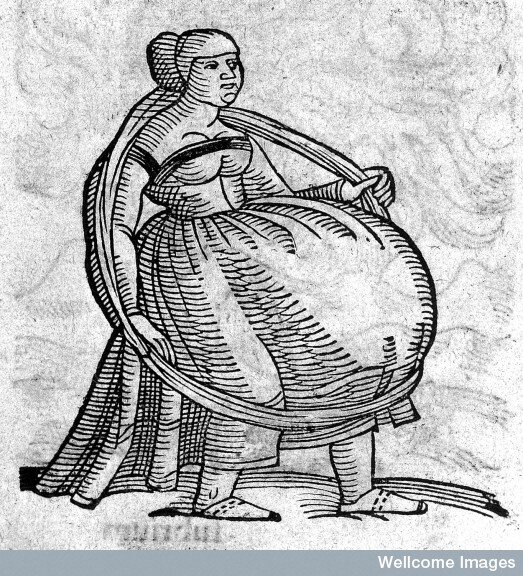Recent
-

Big Enough to Hold All of the World’s Tears: On Losing a Literature Teacher
for Write or Die: And still, I carry the books he gave me—in hope I will be just, in hope I will grow. In hope that students will, like I did him, come to me in trust.
-

My own mother said I was a bad mom, but I chose to forgive her for mom-shaming me
for Insider: The line between trying to help new mothers and judging them is often blurry, a thin tightrope to walk that is not helped by the anxiety and doubt new mothers carry.
-

In Defense of Sophie Turner, It’s Nearly Impossible to Be a “Good Mother”
for Electric Lit: The expectation of erasing oneself and sacrificing everything for your children is crushing
-

Academics Don't Talk About Our Mental Illnesses. We Should.
Higher ed can exacerbate psychological problems, and sometimes even cause them.
-

Ode to Bad Mothers
for The Boston Globe: Motherhood is hard. Immersing myself in the spectacular fails of fictional matriarchs helped me realize I’m not alone in my struggles — and I’m not totally blowing it, after all.
-

The Sad Humiliations of Academic Ghosting
for The Chronicle: Academia is a haunted house.
-

What Black Playwrights Taught Me About Shakespeare
for HuffPost: How might we read, produce and perform Shakespeare’s plays in ways that center Black lives?
-

Shakespeare Already Wrote About What Happens When Women Don’t Have Bodily Autonomy
for Electric Lit: Abortion wasn’t illegal in Shakespeare’s England, like it is in some US states today.
-

When Students Harass Professors
for The Chronicle: One of the lesser-known definitions of harass is “to scrape,” suggesting small, repeated acts of violence that add up to deeper wounds.
-

The Books That Kept My Houseplants Alive
for Outside Magazine: A relationship with plants built on love, care, and respect is at the heart of bringing the outdoors inside
-

Remembering the Bad Boys of My Youth Through Machine Gun Kelly
for Catapult: Like any good fantasy, my desire for all MGK represents is a guilty pleasure, not sustainable or practical.
-

Contemporary Plays, Teaching From the Page as Well as the Stage
for American Theater: The work of writers like Jackie Sibblies Drury, Annie Baker, and Branden Jacobs-Jenkins is riveting in the theatre, but the rewards of close reading shouldn’t be ignored.
-

The monk, the cobra, and me
for The Boston Globe: I wonder when I’ll tell her that snakes represent change. I wonder when she’ll learn that snakes conjure curiosity, enticing us towards worldly pleasures instead of holy austerity.
-

The ‘Combover Subject’: What Lauren Berlant Taught Me About the Academy
for The Chronicle: Berlant’s work calls us to take a hard look at which narratives sustain and conceal the glaring inequities that shape higher education.
-

The (Semi-Hidden) History of Queer Pregnancy in Literature
for Literary Hub: Today, in a world uncomfortably close to the world Shakespeare constructs in A Midsummer Night’s Dream, all kinds of queer people have to fight for individual and collective futures. This is why Torrey Peters’s Detransition, Baby is a revelation.
Peer-Reviewed Publications
-

Giving “Airy Nothings” Shape: Julie Taymor’s A Midsummer Night’s Dream
for Shakespeare Bulletin: the Indian votaress’s presence in the play, as well as Taymor’s staging of her, provides audiences with what performance theorist José Esteban Muñoz, in Cruising Utopia, calls a utopian “then and there” space in a crushing “here and now.”
-

Blue Roses and Other Queer Energies in Tennessee Williams’s The Glass Menagerie
For The Tennessee Williams Annual Review: The concept of a queer aesthetic allows Laura—and the play itself—to be read as actively resisting heteronormative narratives of the good life and as conjuring alternative options for female desire and agency.
-

"For her sake": Queer Pregnancy in A Midsummer Night's Dream.
for Shakespeare Studies: I join the scholarly conversation on Titania's monologue and the larger themes in A Midsummer Night's Dream by centering the Indian votaress's pregnancy as an object of study—she is the alternative "rose distilled" upon which a queer futurity, a better world for reproductive bodies, is conjured.
-

Gary: A Sequel to Titus Andronicus by Taylor Mac (review)
for Shakespeare Bulletin: What can Gary—or any play—accomplish when “bloody sequels” and spectacles of vengeance choke our past and present? Does the theater impact our ability to grapple with “all that’s passed”—or what will? What cuts through the gore?
on pregnancy
-

The Then and There of Transmasculine Pregnancy
for Synapsis: I quote Middleton alongside the anonymous voice of a transmasculine person who has experienced pregnancy to conjure bodies across time that trouble how reproduction is culturally organized.
-

Ophelia's Rue
for Synapsis: Taking the abortive properties of Ophelia’s rue seriously, “as trace, the remains” of the lived experience of women in the early modern period is a step towards breaking the silence and shame that surround abortion today.
-

Two Babies, Two Fathers, One Pregnancy: Superfetation in Myth and Medicine
for Synapsis: Superfetation takes the threat of pregnancy a step further—to be pregnant with two men’s children at once is an act of bodily defiance, to be even more engorged, desirous, and “hot.”
-

Selling Stillbirth, 1569 to Now
for Synapsis: In one of my monthly visits to the Folger Shakespeare Library this year, I called up Pierre Boaistuau’s Certaine secrete wonders (1569). I was looking for a particular image, but found another. An image of a woman, Margreta, that opens the section, “A wonderfull historie of cetaine women which have brought forth a great number of children: And another whiche bare hir first fruite five years dead within hir belly.”
On Parenting
-

An Elegy to Breastfeeding
for Synapsis: That connection—the transfer of fluids that brought my daughter into being, created limbs and legs and second chances while the world watched suspiciously—is gone.
-

Postpartum Exhaustion in William Shakespeare’s The Winter’s Tale and Now
for Synapsis: We, postpartum bodies, are exhausted. Like Hermione, people who have just given birth in our era endure institutional violence, working to preserve themselves in whatever ways they can.
-

Pressure
for The Rush Literary Magazine: a flash nonfiction piece on the onslaught of expectations, as well as joy, I experience as a mother.
On Pedagogy
-

Pedro’s Theory in the Classroom & the Ongoing Project of Crafting an Otherwise
for Tropics of Meta, Gonsalez reminds us that the journey to know ourselves and others, a kind of knowing that is always on the horizon, is its own kind of promised land.
-

Being-With Students, Grades, and Remembering: A Narrative of Dis/Ability in the Classroom
for Visible Pedagogy: Our own perceptions of how we interact with and show up for our students aside, how do final grades shape and twist what students take away from our classes?
-

“It’s in the Syllabus”: Best Practices for the First Day of Class
for Fellow’s Corner: If we stand up in front of our students and read the syllabus to them, are we really teaching them how to refer to important documents for information? That we expect them to do so?
-

Pregnancy and Persona: Negotiating Authority in the Classroom
for Visible Pedagogy: Teaching while pregnant poses a particular set of challenges for women in academia—from daily commutes on public transportation; to adapting past pedagogy to accommodate emotional and physical exhaustion; to communicating with students about a private life that is no longer private.